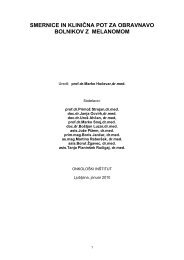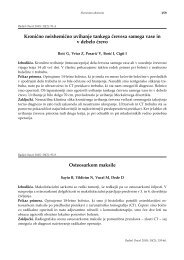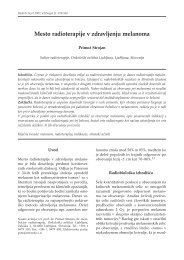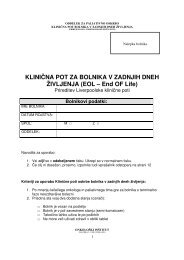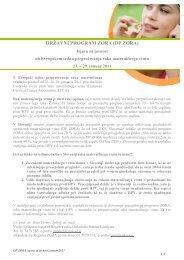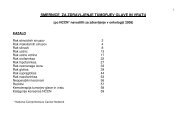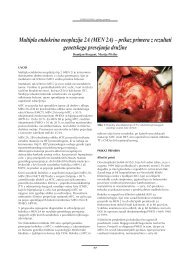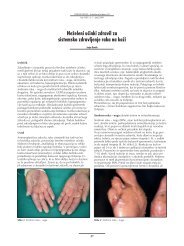Create successful ePaper yourself
Turn your PDF publications into a flip-book with our unique Google optimized e-Paper software.
New inhibitors of human hydroxysteroiddehydrogenases<br />
AKR1C1 and AKR1C3: potential agents<br />
for treatment of hormone dependent forms of cancer<br />
Petra Bro`i~ 1 , Tea Lani{nik Ri`ner 1 , Stanislav Gobec 2<br />
1<br />
Institute of Biochemistry, Medical Faculty, University of Ljubljana, Vrazov trg 2, 1000<br />
Ljubljana, Slovenia; 2 Faculty of Pharmacy, University of Ljubljana, A{ker~eva 7, 1000<br />
Ljubljana, Slovenia<br />
Hydroxysteroid dehydrogenases AKR1C1 and AKR1C3, members of the aldoketo<br />
reductase superfamily, interconvert the active and inactive forms of steroid<br />
hormones. In this manner they are involved in hormonal regulation and function<br />
in human and represent interesting targets for development of drugs for treatment<br />
of hormone dependent forms of cancer like prostate cancer, breast cancer and<br />
endometrial cancer. Recently, non-steroidal anti-inflammatory drugs (NSAIDs) like<br />
indomethacin, flufenamic acid and related compounds have been identified as<br />
potent inhibitors of AKR1C3 and moderate inhibitors of AKR1C1. We have examined<br />
the inhibitory potencies of frequently used NSAIDs that have not been evaluated<br />
yet. In order to obtain more information about structure-activity relationship and<br />
to identify compounds with new scaffolds a series of compounds designed on the<br />
basis of NSAIDs was synthesized and tested for their inhibitory activity against the<br />
recombinant AKR1C1 and AKR1C3. We have shown that it is possible to prepare<br />
selective inhibitors of either AKR1C1 or AKR1C3. IC 50<br />
values that were determined for<br />
compounds with promising inhibitory potency were in low micromolar range which<br />
indicates that new leads were identified and can be used as a good starting point for<br />
future design and synthesis of new inhibitors. New and improved inhibitors would<br />
be important for treatment of hormone-dependent cancers, gastrointestinal tumors,<br />
p4<br />
leukaemia, depression, for maintaining pregnancy and other conditions involving<br />
AKR1C1 and AKR1C3.<br />
75



